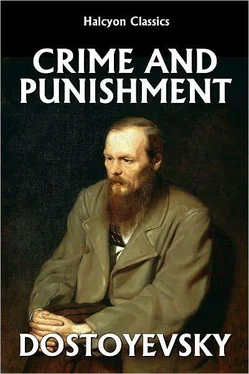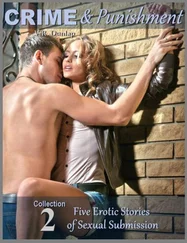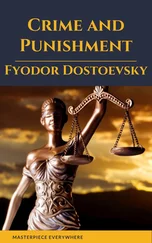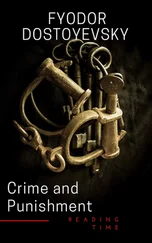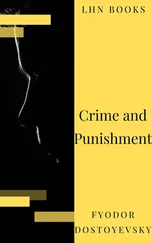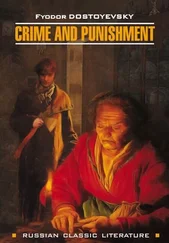"I've brought something to pawn here," and he drew out of his pocket an old–fashioned flat silver watch, on the back of which was engraved a globe; the chain was of steel.
"But the time is up for your last pledge. The month was up the day before yesterday."
"I will bring you the interest for another month; wait a little."
"But that's for me to do as I please, my good sir, to wait or to sell your pledge at once."
"How much will you give me for the watch, Alyona Ivanovna?"
"You come with such trifles, my good sir, it's scarcely worth anything. I gave you two roubles last time for your ring and one could buy it quite new at a jeweler's for a rouble and a half."
"Give me four roubles for it, I shall redeem it, it was my father's. I shall be getting some money soon."
"A rouble and a half, and interest in advance, if you like!"
"A rouble and a half!" cried the young man.
"Please yourself"—and the old woman handed him back the watch. The young man took it, and was so angry that he was on the point of going away; but checked himself at once, remembering that there was nowhere else he could go, and that he had had another object also in coming.
"Hand it over," he said roughly.
The old woman fumbled in her pocket for her keys, and disappeared behind the curtain into the other room. The young man, left standing alone in the middle of the room, listened inquisitively, thinking. He could hear her unlocking the chest of drawers.
"It must be the top drawer," he reflected. "So she carries the keys in a pocket on the right. All in one bunch on a steel ring… And there's one key there, three times as big as all the others, with deep notches; that can't be the key of the chest of drawers… then there must be some other chest or strong–box… that's worth knowing. Strong–boxes always have keys like that… but how degrading it all is."
The old woman came back.
"Here, sir: as we say ten copecks the rouble a month, so I must take fifteen copecks from a rouble and a half for the month in advance. But for the two roubles I lent you before, you owe me now twenty copecks on the same reckoning in advance. That makes thirty–five copecks altogether. So I must give you a rouble and fifteen copecks for the watch. Here it is."
"What! only a rouble and fifteen copecks now!"
"Just so."
The young man did not dispute it and took the money. He looked at the old woman, and was in no hurry to get away, as though there was still something he wanted to say or to do, but he did not himself quite know what.
"I may be bringing you something else in a day or two, Alyona Ivanovna—a valuable thing—silver—a cigarette–box, as soon as I get it back from a friend…" he broke off in confusion.
"Well, we will talk about it then, sir."
"Good–bye—are you always at home alone, your sister is not here with you?" He asked her as casually as possible as he went out into the passage.
"What business is she of yours, my good sir?"
"Oh, nothing particular, I simply asked. You are too quick… Good–day, Alyona Ivanovna."
Raskolnikov went out in complete confusion. This confusion became more and more intense. As he went down the stairs, he even stopped short, two or three times, as though suddenly struck by some thought. When he was in the street he cried out, "Oh, God, how loathsome it all is! and can I, can I possibly… No, it's nonsense, it's rubbish!" he added resolutely. "And how could such an atrocious thing come into my head? What filthy things my heart is capable of. Yes, filthy above all, disgusting, loathsome, loathsome!—and for a whole month I've been…" But no words, no exclamations, could express his agitation. The feeling of intense repulsion, which had begun to oppress and torture his heart while he was on his way to the old woman, had by now reached such a pitch and had taken such a definite form that he did not know what to do with himself to escape from his wretchedness. He walked along the pavement like a drunken man, regardless of the passers–by, and jostling against them, and only came to his senses when he was in the next street. Looking round, he noticed that he was standing close to a tavern which was entered by steps leading from the pavement to the basement. At that instant two drunken men came out at the door, and abusing and supporting one another, they mounted the steps. Without stopping to think, Raskolnikov went down the steps at once. Till that moment he had never been into a tavern, but now he felt giddy and was tormented by a burning thirst. He longed for a drink of cold beer, and attributed his sudden weakness to the want of food. He sat down at a sticky little table in a dark and dirty corner; ordered some beer, and eagerly drank off the first glassful. At once he felt easier; and his thoughts became clear.
"All that's nonsense," he said hopefully, "and there is nothing in it all to worry about! It's simply physical derangement. Just a glass of beer, a piece of dry bread—and in one moment the brain is stronger, the mind is clearer and the will is firm! Phew, how utterly petty it all is!"
But in spite of this scornful reflection, he was by now looking cheerful as though he were suddenly set free from a terrible burden: and he gazed round in a friendly way at the people in the room. But even at that moment he had a dim foreboding that this happier frame of mind was also not normal.
There were few people at the time in the tavern. Besides the two drunken men he had met on the steps, a group consisting of about five men and a girl with a concertina had gone out at the same time. Their departure left the room quiet and rather empty. The persons still in the tavern were a man who appeared to be an artisan, drunk, but not extremely so, sitting before a pot of beer, and his companion, a huge, stout man with a grey beard, in a short full–skirted coat. He was very drunk: and had dropped asleep on the bench; every now and then, he began as though in his sleep, cracking his fingers, with his arms wide apart and the upper part of his body bounding about on the bench, while he hummed some meaningless refrain, trying to recall some such lines as these:
"His wife a year he fondly loved His wife a—a year he—fondly loved."
Or suddenly waking up again:
"Walking along the crowded row He met the one he used to know."
But no one shared his enjoyment: his silent companion looked with positive hostility and mistrust at all these manifestations. There was another man in the room who looked somewhat like a retired government clerk. He was sitting apart, now and then sipping from his pot and looking round at the company. He, too, appeared to be in some agitation.
Raskolnikov was not used to crowds, and, as we said before, he avoided society of every sort, more especially of late. But now all at once he felt a desire to be with other people. Something new seemed to be taking place within him, and with it he felt a sort of thirst for company. He was so weary after a whole month of concentrated wretchedness and gloomy excitement that he longed to rest, if only for a moment, in some other world, whatever it might be; and, in spite of the filthiness of the surroundings, he was glad now to stay in the tavern.
The master of the establishment was in another room, but he frequently came down some steps into the main room, his jaunty, tarred boots with red turn–over tops coming into view each time before the rest of his person. He wore a full coat and a horribly greasy black satin waistcoat, with no cravat, and his whole face seemed smeared with oil like an iron lock. At the counter stood a boy of about fourteen, and there was another boy somewhat younger who handed whatever was wanted. On the counter lay some sliced cucumber, some pieces of dried black bread, and some fish, chopped up small, all smelling very bad. It was insufferably close, and so heavy with the fumes of spirits that five minutes in such an atmosphere might well make a man drunk.
Читать дальше
